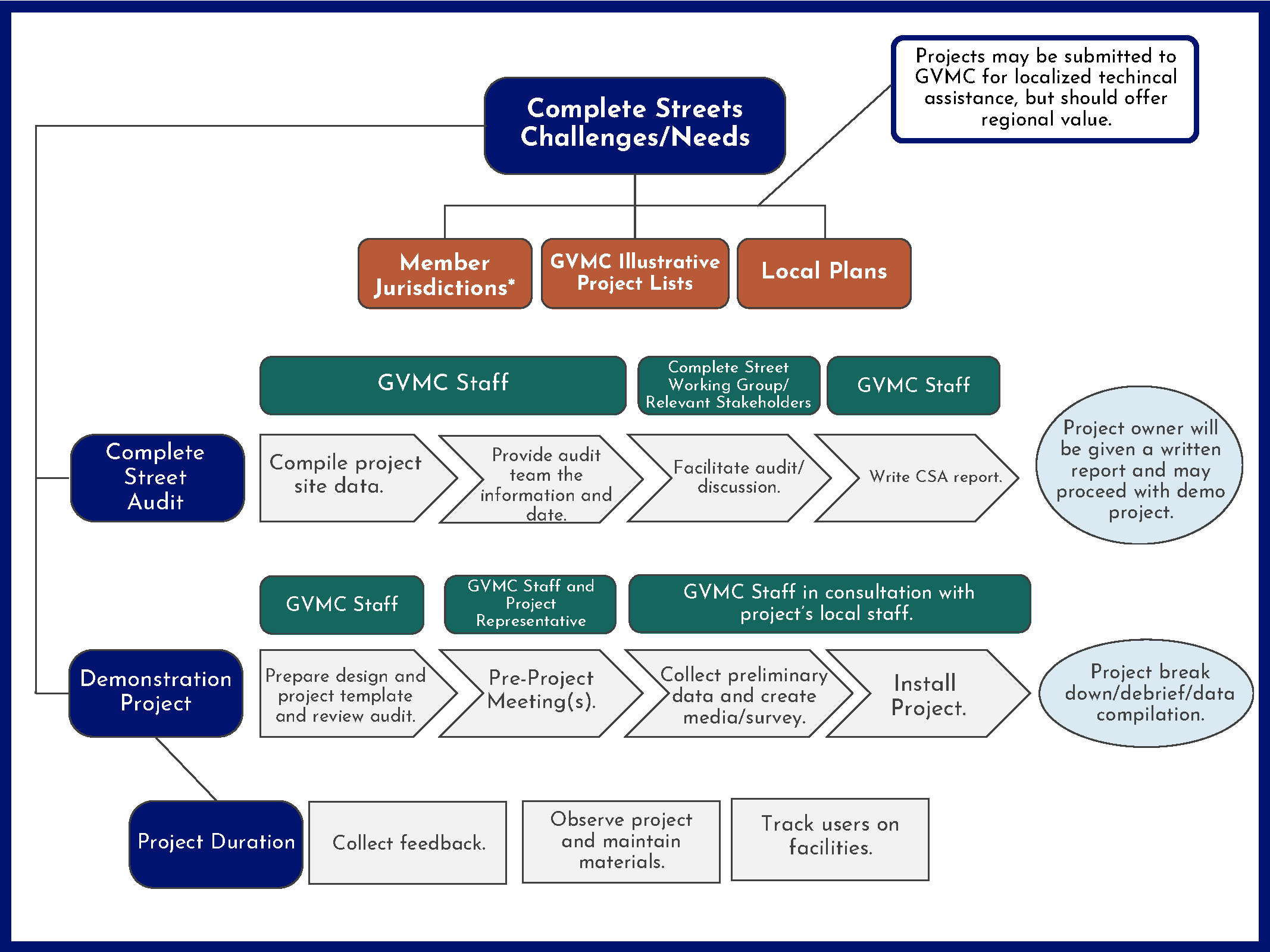
Complete Streets Planning
About
A complete street is safe, and feels safe, for everyone using the street. FHWA and FTA seek to help Federal aid recipients plan, develop, and operate streets and networks that prioritize safety, comfort, and access to destinations for people who use the street network, including pedestrians, bicyclists, transit riders, micro-mobility users, freight delivery services, and motorists. The goal is to provide an equitable and safe transportation network for travelers of all ages and abilities, including those from marginalized communities facing historic disinvestment. Complete Streets legislation was signed in August of 2010 in the state of Michigan. The Bipartisan Infrastructure Law (BIL) defines Complete Streets standards or policies as “standards that ensure the safe and adequate accommodation of all users of the transportation system, including pedestrians, bicyclists, public transportation users, children, older individuals, individuals with disabilities, motorists, and freight vehicles.” The BIL requires MPOs to use at least 2.5% of their FHWA planning funds on Complete Streets planning as of January 5, 2023.
The current and previous complete streets planning activities conducted by GVMC can be found within the Unified Planning Work Program.
For more information on Complete Streets, please email or call Peter Kimball, Transportation Planner, at (616) 776 -7601.
Complete Streets Analysis and Data Viewer
GVMC has developed a Complete Streets map and analysis ranking all the arterials in the GVMC planning area. This map is intended to be a launching point where jurisdictions can look to start implementing complete streets. This initial ranking rated arterial segments based on availability of all modal facilities without taking the surrounding land use into consideration. Though a 7 is the highest score a segment can score using this ranking system, it might not indicate an “ideal” complete street configuration based on a context sensitive understanding of users and surroundings of the segment. The percentage of arterials for each of the previously described rankings can be seen in the chart below. To read more about the analysis, view the documentation here.
Demonstration Project Program
GVMC has started a pilot demonstration project program. Demonstration projects are short term, low cost, temporary roadway projects to pilot potential long-term design solutions to improve roadways for all users. Not only can members observe how the public interacts with the temporary changes to the facility, but they can also receive substantial feedback through several stages of public outreach conducted by GVMC throughout the project. The pilot projects are intended to improve complete streets infrastructure and provide members with data before making higher cost long term decisions.
Demonstration Projects have several benefits including:
· Tests aspects of a project’s design before making further investments
· Inspire action and build support for future permanent implementation
· Further public awareness of the concern and potential action
· Increase public engagement by inviting stakeholders to try improvements for active transportation
· Deepen understanding of active transportation needs in the community
· Encourage people to work together in new ways and strengthen relationships between government agencies, non-profit organizations, local businesses, and residents
· Gather data from real-world users and public spaces
Project Process
Complete Street Audit
Selected sites will go through a two-part process that aims to gather and process as much knowledge of a specific site as possible. GVMC develops an overview of the facility characteristics (ex. Crash data, Volumes, Near Misses) and provides these to a multidisciplinary team to conduct a Complete Street Audit. The team visits the project site to discuss potential and known issues from all roadway user types at the location as well as potential ways to address those issues. The audit is then documented and provided to the appropriate parties to help determine/ confirm the best possible demo project.
Demonstration Project
Following the completion of the complete street audit, the demonstration project will be installed for an agreed up on time with the facility owner. Data will be collected to develop a report on the reception and applicability of the demo project in a future permanent format. The full process can be seen in the following chart.
Past Demonstration Projects
1. Fred Meijer Standale Trail Crossing @ Leonard Street - Walker, MI
2. 52nd Street crosswalk @ Primrose Street - Kentwood, MI
Current and Upcoming Demonstration Projects
3. Lakeside Dr. SE Roundabouts - East Grand Rapids, MI
4. Port Sheldon @ Alden Elementary School
We have completed all demonstration projects for the year, come back in the spring for more upcoming projects!
External Resources
Complete Streets Policy Framework
Federal Highway Administration Complete Streets Resources
MDOT Complete Streets Advisory Council
Michigan Complete Streets Coalition
Local Plans, Policies, and References:
*Stand Alone Complete Streets Plan or Policy
Allendale Township – Master Plan (Includes Complete Street Analysis)
Alpine Township – Master Plan (Recommends complete streets when contextually appropriate)
Caledonia Township – Master Plan (Includes Complete Streets as Community Service Goal)
Cascade Township – Complete Streets Plan*
Coopersville – Master Plan (Complete Streets is mentioned in future transportation planning)
East Grand Rapids – Mobiity Bike Action Plan*
Gaines Township – Master Plan (Mentions Complete Streets philosophy)
Grand Rapids – Vital Streets Program: Improving Transportation*
Hudsonville – Master Plan (Includes Complete Streets Implementation Strategy)
Jamestown Township – Master Plan (Identifies key means to implement Complete Streets)
Kent County Road Commission – Complete Streets Policy*
Kentwood – Master Plan (Includes adopting Complete Streets Policy as strategy)
Lowell Charter Township- Master Plan (Includes Complete Street Analysis)
Rockford – Master Plan (Includes objective of developing complete streets network)
Tallmadge Township – Master Plan (Identifies key means to implement Complete Streets)
Vergennes Township – Master Plan (Includes Complete Streets Policy in future implantation list)
Walker – Complete Streets Policy*
Wyoming- Master Plan (Mentions coordinating Complete Streets with development)


